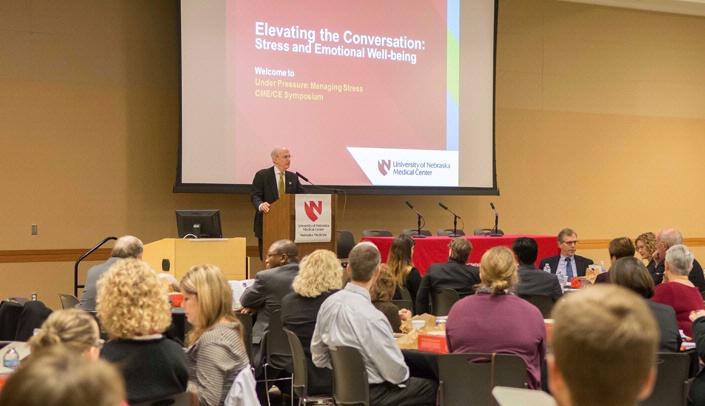Health care professionals walk a tightrope — one that teeters between the awe of experiencing a person’s first breath to the emotions that surround someone’s last.
Too many providers, however, are struggling in their profession.
Last year, a Mayo Clinic/American Medical Association study found that 54 percent of physicians surveyed in 2014 had at least one symptom of burnout, up from 45 percent just three years earlier. Burnout among people working in other professions remained the same.
“We have a problem of epic proportions,” said Lisolette Dyrbye, M.D., a world expert on medical student, resident and physician well-being. “We need to recognize it, talk about it and turn the tide around.”
Dr. Dyrbye made those comments Jan. 27 to more than 330 people during a UNMC symposium titled “Elevating the Conversation: Stress and Emotional Well-being,” a frank conversation about the mental well-being of the nation’s health care providers and trainees.
“The statistics on stress, burnout, depression, and unfortunately, suicide, are stunning,” said UNMC Chancellor Jeffrey P. Gold, M.D. “It’s tragic for every individual involved.”
Devastating for the workforce, burnout (defined as emotional exhaustion, depersonalization and lower personal accomplishment) also threatens professionalism, empathy, medical knowledge and patient care, Dr. Dyrbye said.
And, it doesn’t begin after Match Day.
“Matriculating medical students have better mental health profiles than their peers who choose other careers, but then it flips and persists through practice,” she said, noting its origins are rooted in the learning and work environment where competition is fierce and support systems are inadequate.
Interestingly, workload was not an independent predictor of burnout, she said. And, she said, studies have shown that students in pass/fail curriculums have lower levels of stress and burnout, and perform just as well as other students.
UNMC’s dialogue on how to improve emotional well-being within the health care community will continue, said Dele Davies, M.D., vice chancellor for academic affairs. “Dark periods are inevitable, but when they come, we all need to shine a light to help each other so we change the whole environment. There are plenty of “light” resources at UNMC and we plan to expand them even further.”
